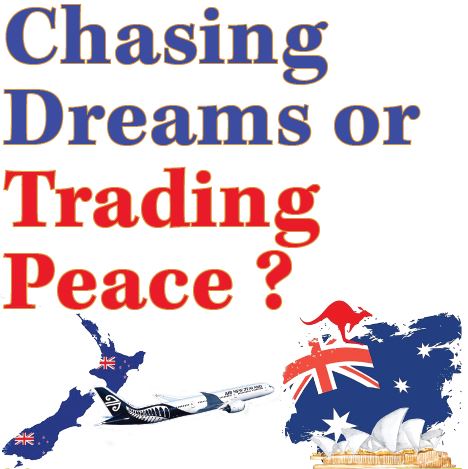Over the past two decades, a steady stream of New Zealanders has been heading across the Tasman in search of a brighter future. Whether it’s the promise of higher wages, a lower cost of living, or simply more opportunities for their children, the migration of Kiwis to Australia continues to grow—despite efforts by the New Zealand government to slow the tide.
While policymakers have introduced various measures to retain talent and improve living standards at home, these steps don’t seem to be enough. For many Kiwis, the draw of Australia’s more affordable housing market, lower interest rates, and higher income potential is simply too hard to ignore. With families under increasing financial pressure, particularly in cities like Auckland and Wellington, relocating to Australia seems like a practical solution to escape the rising costs of everyday life.
But a new survey suggests that this financial gain might come at a cost that’s harder to measure—one that impacts personal well-being and job satisfaction.
The survey, conducted by Great Place to Work and based on the responses of more than 156,000 employees from both New Zealand and Australia, reveals a surprising twist: while Australians may be earning more, New Zealanders are often happier in their workplaces. The study found that New Zealand organisations outperformed their Australian counterparts in 48 out of 60 key workplace culture categories, including fairness, inclusivity, transparency, and ethical leadership.
According to the survey, only 55% of Australian workers believe they are fairly paid—a figure that’s not particularly high despite the country’s reputation for better wages. More concerning, just 51% felt that their workplace was psychologically healthy, and only 58% believed that redundancies would be treated as a last resort. These statistics highlight a potential gap in how workers are treated across the ditch, especially when it comes to creating safe, supportive work environments.
Rebecca Moulynox, General Manager for Great Place to Work, shed more light on the issue during an appearance on Breakfast. She explained that Kiwis were 5% more likely than Australians to say that their managers were honest and ethical, and that New Zealand businesses tend to better understand the value of treating employees with respect and empathy.
“New Zealand companies are a little bit ahead of the curve,” she said. “They’re seeing the difference that treating employees the right way makes for their organisations.”
Moulynox acknowledged the powerful lure of a bigger pay check but cautioned against basing a life-changing decision solely on salary. “At the end of the day, no amount of money is worth your mental health,” she said. “It’s about finding a workplace that aligns with what matters most to you—whether that’s flexibility, inclusion, transparency, or job security.”
She encouraged anyone considering a move—whether to another country or even just a different company—to thoroughly assess the workplace culture they’d be stepping into. “Ask real questions,” she urged. “If flexibility is important to you, ask about it. If you value diversity and inclusion, ask how those voices are represented in decision-making. Don’t be afraid to dig deep during the interview process.”
The insight here is simple, yet profound: more money doesn’t always mean a better life. While Australia may offer financial advantages, the overall experience—especially in the workplace—can vary greatly. Kiwis who are thriving in supportive, inclusive work environments at home may find themselves trading peace of mind for a pay raise.
Ultimately, the decision to move to Australia is deeply personal and depends on a range of factors. But Moulynox’s message is clear: don’t underestimate the value of being treated well at work. For many, true success might be found not in a bigger pay check, but in a healthier, more fulfilling professional life. After all, sometimes the grass is only greener because it’s being watered with more care. -TIN Bureau


